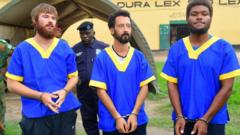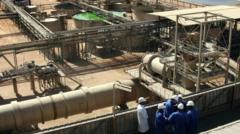**The trio was involved in a failed coup attempt in the Democratic Republic of Congo and faced a military court's death penalty; their return is part of a broader diplomatic engagement between the U.S. and DR Congo.**
**Three Americans Repatriated After Conviction in DR Congo Coup Attempt**

**Three Americans Repatriated After Conviction in DR Congo Coup Attempt**
**Following a comutation of their death sentences, three Americans are set to complete their prison terms back in the U.S.**
The three Americans involved in a failed coup attempt in the Democratic Republic of Congo (DR Congo) last year have now been repatriated to the U.S. to serve the remainder of their prison sentences. Initially sentenced to death by a military tribunal, their sentences were commuted to life in prison just last week. The U.S. Department of State confirmed that the individuals—Marcel Malanga Malu, Tylor Thomson, and Zalman Polun Benjamin—are now "in our custody" after their return flight from Kinshasa.
This development unfolds as the U.S. and DR Congo are in discussions aimed at utilizing the central African country's substantial mineral resources. High-level meetings, recently including U.S. President Donald Trump’s senior adviser for Africa, have indicated potential "multibillion-dollar investments" in mineral extraction as well as improved bilateral relations. DR Congo is rich in vital resources such as coltan and cobalt, which are crucial for modern electronics and electric vehicle batteries, currently predominantly harvested by Chinese firms.
Presidential spokesperson Tina Salama indicated that the three were transferred to N'Djili International Airport under strict compliance with legal protocols, marking a step towards enhanced judicial diplomacy between the two nations. Last September, a military court sentenced 37 individuals, including the trio, to death for their involvement in an armed attack on the president's palace and an ally's residence. The suspected plot leader, Christian Malanga, a U.S. citizen of Congolese descent, lost his life during the assault.
There remains uncertainty about the fate of other defendants with varying nationalities, including a British, Canadian, and Belgian citizen. Some experts suggest the U.S. may not intervene to reduce the sentences of these individuals. The State Department has firmly denounced the violent coup attempt and, while supporting DR Congo’s ability to pursue accountability, has also called for humane treatment throughout legal processes.
Additionally, there are reports of DR Congo agreeing to reimburse damages relating to protests that targeted U.S. diplomatic missions earlier this year, further underlining the complexities of this diplomatic exchange. As the situation develops, the intricacies of international relations and justice in DR Congo remain in sharp focus.
This development unfolds as the U.S. and DR Congo are in discussions aimed at utilizing the central African country's substantial mineral resources. High-level meetings, recently including U.S. President Donald Trump’s senior adviser for Africa, have indicated potential "multibillion-dollar investments" in mineral extraction as well as improved bilateral relations. DR Congo is rich in vital resources such as coltan and cobalt, which are crucial for modern electronics and electric vehicle batteries, currently predominantly harvested by Chinese firms.
Presidential spokesperson Tina Salama indicated that the three were transferred to N'Djili International Airport under strict compliance with legal protocols, marking a step towards enhanced judicial diplomacy between the two nations. Last September, a military court sentenced 37 individuals, including the trio, to death for their involvement in an armed attack on the president's palace and an ally's residence. The suspected plot leader, Christian Malanga, a U.S. citizen of Congolese descent, lost his life during the assault.
There remains uncertainty about the fate of other defendants with varying nationalities, including a British, Canadian, and Belgian citizen. Some experts suggest the U.S. may not intervene to reduce the sentences of these individuals. The State Department has firmly denounced the violent coup attempt and, while supporting DR Congo’s ability to pursue accountability, has also called for humane treatment throughout legal processes.
Additionally, there are reports of DR Congo agreeing to reimburse damages relating to protests that targeted U.S. diplomatic missions earlier this year, further underlining the complexities of this diplomatic exchange. As the situation develops, the intricacies of international relations and justice in DR Congo remain in sharp focus.


















